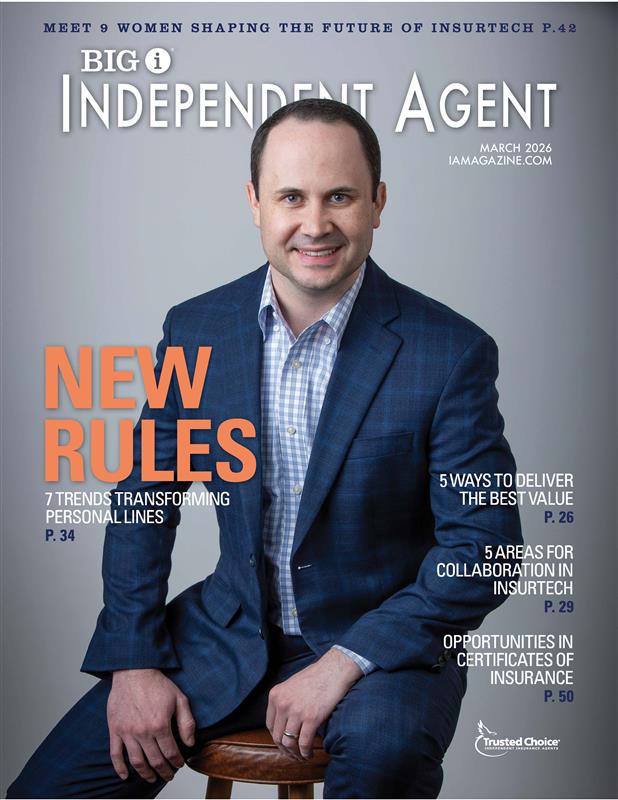Defend Your Turf: 3 Smart Reactions to InsurTech

By: Jacquelyn Connelly
Rolling your eyes at the word “disruptors”? You’re not alone.
But if you’ve got one eye on the future, chances are you’re already bracing for the massive change underway from the InsurTech movement. When EY recently surveyed 530 agents—55% focused on property-casualty, 27% on small commercial and 15% on life—it found that:
- 77% say they would value technology that would help them identify new opportunities to sell products in their existing book of business.
- 63% would value illustration tools to help them show clients what they’re buying.
- 50% believe there’s a need for new and innovative products so they can grow their business.
- 47% would value an app that assists them in a guided selling mode.
“What that tells us is that at least a significant share of insurance agents really want to compete in the new way,” says Bernhard Klein Wassink, partner, Global Insurance Customer & Growth Offering, EY. “We believe agents want to punch back and defend their turf—be modern, be with it, be digital. That’s an important counter-story.”
Klein Wassink doesn’t believe we’re going to end up in a world with zero insurance agents—instead, he anticipates a hybrid world, similar to what happened with the banking industry. “Insurance is going through that same transformation with this attitude of agents, where they are willing to play in that omnichannel world,” he explains. “Don’t assume that business models that are often developed for urban millennials will dominate the whole U.S. or the world.”
So what can you do to ensure your agency has a firm foothold in the new landscape? Here are three smart reactions to the InsurTech movement:
1) Specialize. Ellen Carney, principal analyst, digital business strategy at Forrester Research, Inc., says she notices a trend toward specialization among “smart agencies,” whether it’s a focus on multitenant housing, driver’s support logistics and delivery companies like FedEx, or churches, nonprofits and educational institutions.
“They’re specializing in a very particular line of coverage, and then based on the word-of-mouth factor, they’re becoming the solution those kinds of businesses gravitate toward,” Carney explains. “It’s going to be hard for a digital [InsurTech] broker to become that specialized.”
Richard Kerr, CEO of MarketScout, believes specialization is so crucial to the future viability of independent agencies that he’s not very optimistic about the survival of those that don’t adopt this approach—and fast.
“Until a year and a half ago, I was always saying, ‘Independent agents don’t have anything to worry about, because you create value.’ But now, if you’re not a specialist in a particular area, offering technical expertise about something like how to insure medical marijuana or auto parts—sell your company today,” Kerr says. “You’ll get a lot of money for it, and you’re going to get killed in the next five years.”
For more information on how to make specialization work for your agency, keep an eye out for February IA, coming soon.
2) Provide high-value risk management—across your entire book. This one’s a no-brainer, and hopefully you’re already doing it. In the commercial space, “the larger and the more specialized you get, the more you need the kind of expertise and advice that a human intermediary is going to provide. You need an adviser in there, and will for a long time,” says Mark Breading, partner at Strategy Meets Action.
Where InsurTechs will struggle, Carney says, is achieving “the degree of industry intimacy” an independent agent prides themselves on developing—”knowing what drives a particular industry, and how to make that customer successful in that industry. That ends up being a whole lot harder in a digital-only channel.”
But even lines where you’re accustomed to simply renewing on an annual basis will require more attention and risk management services in the future. “I’m not saying agents don’t provide advice today—especially in the more complex commercial lines, certainly they do,” Breading says. “But even in personal lines in the future, it’s going to be a more of an ongoing relationship where it’s really a risk management proposition, trying to help customers manage their risk better using real-time information from the Internet of Things (IoT).”
Consider personal auto, which Breading says “is going to get more complicated as we move more and more toward telematics and autonomous vehicles. I expect that 10 years from now, there are still going to be independent agents selling auto insurance.”
Same goes for homeowners: “The tech-savvy agent is going to understand the possibilities with a smart home, understand which insurers have options that give discounts or have packages for smart home devices or have risk management advice for homeowners,” Breading predicts. “If the agent is in the middle of that, helping folks understand it all, I just don’t think homeowners will be 100% digital direct, even 10 years down the line.”
Across all lines of insurance, then, InsurTech will, by necessity, “change the character of what an agent does from salesperson to much more like what we see on the commercial lines side—the smart loss control person who’s going to be much more of a consultant around risk as opposed to a seller of a product,” Carney says. “They’re going to be not only selling insurance, but also providing non-insurance services—water leak detection, home surveillance, all kinds of cyber coverage.”
“There’s a scale of providing access to products to providing advice. Where on that scale do you want to play?” Klein Wassink agrees. “There are many excellent agents that are far to the right—they provide excellent advice and help consumers cover themselves for risk they otherwise wouldn’t cover themselves for. But unfortunately, there are also agents that basically just provide access to a product and hope that you’ll buy it, and I don’t think that’s a value proposition.”
3) Leverage tech where the personal touch doesn’t matter. Of course, all of the above does not give you an excuse to ignore technology. “It’s not a binary thing where you’re either digital or you’re not,” Breading says. “The right attitude for an agent to have is that you should want every customer to go digital to some extent, because it’s a win-win situation.”
That means providing digital capabilities for your clients to complete some basic transactions or inquiries online, thereby offloading some of the workload so your staff “can concentrate on the relationship and selling,” Breading says. “There’s a way you can do that where you keep the agent in the loop—it’s not that they don’t know what activities are occurring. It’s just that there’s an awful lot of administrative work going on, and why wouldn’t you want to give your clients better capabilities to do it in self-service way?”
Traditionally, independent agencies have wanted to own the entire client relationship—”the sales, the servicing, everything,” Klein Wassink says. But according to EY’s survey, “that’s breaking down. The majority of agents report they would be willing to give up their role in servicing to free up more time to sell to be more with that client.”
Of course, “it’s not 100%, and it shouldn’t be. There’s a role for advice, there’s a role for advisers. But they may have to act differently,” Klein Wassink suggests. “The paperwork the adviser handles for you when you finally sign up is completely value-free. The advice is where the value is—the conversation where they help you figure out what you need. That’s the value. So get rid of the paperwork. Digitize that.”
Based on its survey results, EY reports that almost half of agents could be described as “agents of the future,” whereas 40% are on the fence—”agents who feel moderately positive about digital, but wouldn’t be the first to move,” Klein Wassink says. The remaining 13% appear to have “given up.”
If you’re in one of the first two groups, the future could be bright. If you’re in the latter? Less so. “If you feel like, ‘It’s all manual and it’s all about my relationships, I’ll just fax in the app and I don’t really need a modern website, who needs mobile capability?’ Honestly, there might be some policyholders that are still fine with that, but that’s not going to last too long,” Breading cautions. “The world’s changing pretty fast. If you’re planning on being around for a while and growing, you’ve got to modernize your technology platform.”
“There’s always a fighting chance,” Kerr agrees. “But my peers, the principals who are my age, saying ‘Oh, we don’t want those clients’? Those guys are out of their minds.”
Jacquelyn Connelly is IA senior editor.










